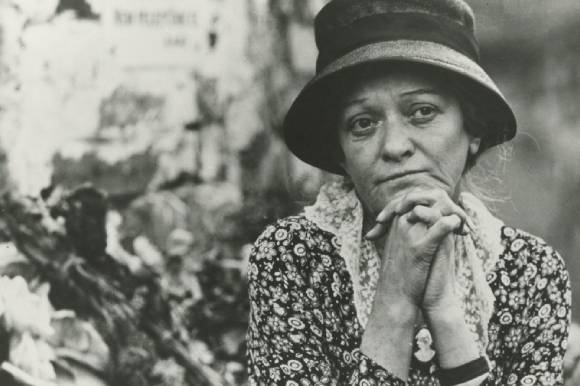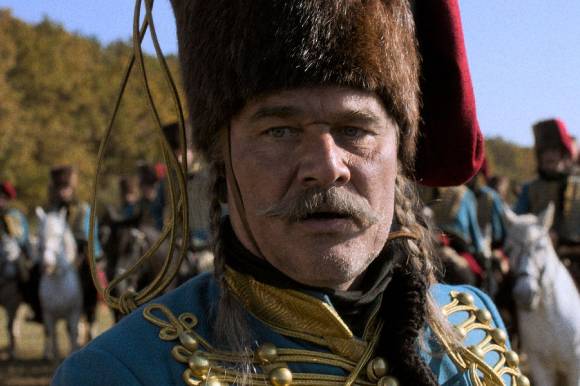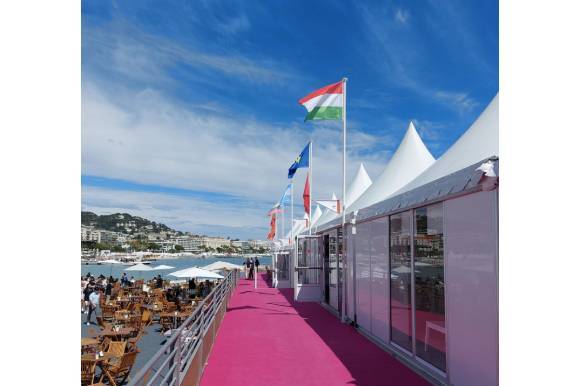In the wake of Miklós Jancsó’s The Round Up (Szegénylegények), Károly Makk’s Love (Szerelem), Zoltán Fábri’s Merry-Go-Round (Körhinta), Péter Bacsó’s The Witness (A tanú), Sándor Sára’s The Upthrown Stone (Feldobott kő) and Márta Mészáros’s Diary for My Children (Napló gyermekeimnek), now Judit Elek’s film The Lady from Constantinople (Sziget a szárazföldön) has been invited onto the programme of the Cannes festival starting on 16 May. This is the festival’s way of paying tribute to the Kossuth and Balázs Béla Prize laureate director, who recently celebrated her 85th birthday, for her lifework spanning half a century.
 Judit Elek attended the directing faculty of the Academy of Drama and Film between 1956 and 1961, graduating from the class of Félix Máriássy. She launched her career as a dramaturg at Budapest Film Studio; she was a founding member of the Balázs Béla Studio.
Judit Elek attended the directing faculty of the Academy of Drama and Film between 1956 and 1961, graduating from the class of Félix Máriássy. She launched her career as a dramaturg at Budapest Film Studio; she was a founding member of the Balázs Béla Studio.
Her taboo-breaking documentaries and feature films depict human relationships, sensitive social or historical topics with profound compassion and powerful emotion.
Her debut feature film was The Lady from Constantinople (1969), the story of a solitary, elderly lady (Manyi Kiss) living in a large flat in a Budapest apartment block, stranded amidst memories of her youth. Pressured by her neighbours, who live stressful lives in their cramped shared apartments, she decides to swap her flat for a smaller one. The film is an authentic evocation of the atmosphere of Budapest in the 1960s, its unique character being that it blends a documentary-like depictive method with surrealism and grotesque humour. The screenwriter was Iván Mándy, who had already worked on Judit Elek’s short Encounter (Találkozás, 1963), and the cinematographer was Elemér Ragályi (who sadly died recently), with whom she had already collaborated on the film How Long Does a Man Live? (Meddig él az ember?, 1967). Ragályi filmed the story, which is based on a series of everyday-life tableaux, with a light, free-moving hand-held camera, which greatly contributed to the authenticity and mobility of the work. The ground-breaking combination of documentary and feature film techniques anticipated documentary features that came out of the Budapest School. Manyi Kiss, who played the lead in The Lady from Constantinople, occupies a special place in Hungarian film history because of her natural acting filled with delicate gestures and melancholy.
Films by Judit Elek have appeared at Cannes four times already, first in 1968 when How Long Does a Man Live? was screened in the Critics’ Week section. The Lady from Constantinople received a standing ovation when it was shown outside competition in 1972. Now, after the passage of over half a century, the recently restored film, on the restoration work of which cinematographer Elemér Ragályi also assisted, can return to the venue of its triumph.
The Hungarian National Film Institute – Film Archive has restored key works of the oeuvre of the director on the occasion of her 85th birthday.
Read more on the Cannes Film Festival website
NFI WORLD SALES highlights
HADIK (B&L Line production, feature, completed)
 An ultimate multicultural European historical-adventure drama where Andras Hadik, the greatest Hungarian general married to a Polish princess serving the Austrian Queen stops the aggressive Prussian conquerors with a ragtag team of Hungarian, Saxon, Austrian and Croatian misfit soldiers.
An ultimate multicultural European historical-adventure drama where Andras Hadik, the greatest Hungarian general married to a Polish princess serving the Austrian Queen stops the aggressive Prussian conquerors with a ragtag team of Hungarian, Saxon, Austrian and Croatian misfit soldiers.
FOUR SOULS OF COJOTE (Cinemon Ent. production, English-language animation feature, completed)
Annecy’s Crystal Prize winner Aron Gauder new feature. - Through a unique re-telling of the creation of the universe, the film highlights the increasingly pressing need to live in harmony with the environment, before it is too late. Set in the present day, Native American teenagers confront the crew of an oil pipeline project, just down the hill from the land of their ancestors. The grandfather evokes the ancient tale of their Creation myth, reminding all of us that the challenges facing humanity are universal, and that we need to find our place in the great circle of creatures.
SIX WEEKS (Sparks production, feature, completed)
Noemi Szakonyi Veronika’s Tallinn IFF Just Film Grand Prix winner debut feature tells the story of an open adoption. A table tennis player teenage girl after getting pregnant, decides to adopt the baby to a couple who had been waiting to become parents for a long time. She has six weeks to change her mind after giving birth, which is an extremely difficult period of time emotionally for both parties.
SEMMELWEIS – in post-prod
Oscar-nominated cinematographer and director Lajos Koltai’s (Fateless, Evening, Malena) new feature is a period biopic drama set in 1847, when a mysterious epidemic is raging in a maternity clinic in Vienna, while the doctor Ignác Semmelweis tries to defeat puerperal fever by going against all traditional theories. The led is played by Hungary’s most promising young actor Miklos H. Vecsei and cinematographed by Andras Nagy, produced by Tamas Lajos (Film Positive)
THE LEFKOVICSES ARE IN MOURNING – in post-prod
First feature film by Ádám Breier is a dramedy about the generous but stubborn elderly boxing coach, who gets along well with everyone but his own son. They have not spoken since the boy, moved to Israel and became religious in an orthodox Jewish community. When the father's beloved wife dies unexpectedly, his son arrives home with his never-seen grandson to observe the week of religious mourning at his home. Father and son reunited during the one-week shiva must face old grievances. Produced by Kázmér Miklós, Felszeghy Ádám, Ausztrics Andrea (ULab, Proton Cinema)
CAT CALL – in post-prod
First feature film by Rozália Szeleczki, a romantic comedy centring on 30-year-old Fáni, who is successful at work but is lonely in her private life. She is trapped in a world of her own imagination: ever since her father died when she was a young child, she has pictured the death of each man she finds attractive. But one day, a talking black cat starts courting her, and she falls for the mysterious creature, even though only she can hear him speak. She escapes reality to dedicate herself to this whimsical relationship, but it soon begins to turn dangerous. Produced by Petra Iványi (Lupa Pictures)
I ACCIDENTALY WROTE A BOOK – in production
Based on the multi-award-winning children’s book by Dutch writer Annet Huizing, is directed by Nora Lakos (Cream), and produced by Claudia Sümeghy for JUNO11 Pictures. The film is about Katinka, a 13-year-old girl who wants to be a writer. While she is learning to write with the help of her neighbour, she suddenly realises that her life is actually becoming a novel. As she writes, she experiences her deeply hidden grief that makes her able to open her heart for someone new.




















